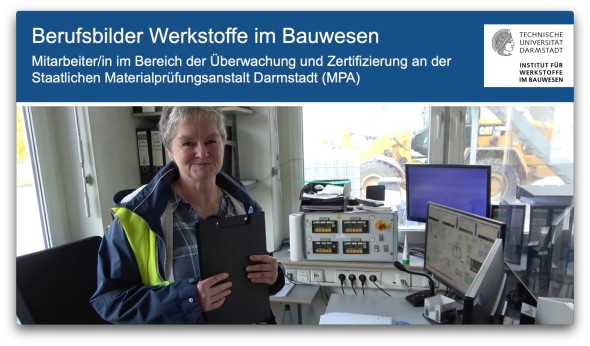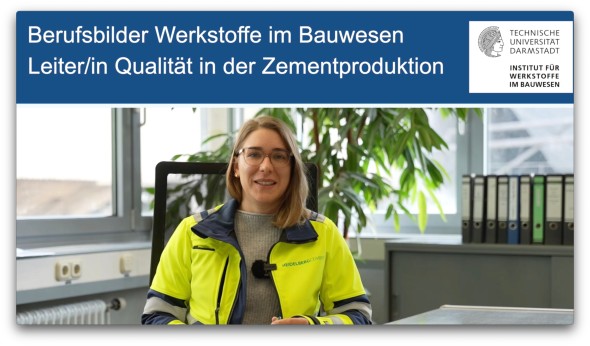Occupational profiles
What can I become if I choose the focus in the Master “Materials Science in Construction”? When and for what do I need knowledge of building physics? Why is it so important to know about concrete quality also in project management? What qualifications are needed to prepare damage assessments in civil engineering?
We would like to try to answer these questions with the following examples of job descriptions. If we do not quite succeed, simply contact us directly. We will be happy to answer your questions as best we can.
As part of the program “Student E-Learning Experts” of the HDA our project to create short films about job profiles in the field of construction materials is funded. In our first video we present the job description as a research assistant at our own institute. In the coming months, further short films will provide exciting insights into the working world in this field.
Materials Scientist
As a researcher in materials science, you work at a university, in a research company, or in the research and development department of a company (chemical groups, cement industry, etc.). At a university or in a research company, you conduct basic research, but also develop construction materials that are relevant to practice, often cooperating with industrial partners. You apply for projects, design and work on experimental programs, write publications, attend conferences and perform reviewer duties. In the research and development department of a company, you primarily develop new products, but are often also entrusted with the quality assurance of existing products.
The choice of this career profile is particularly suitable for you if you are enthusiastic about scientific topics, can find creative solutions to everyday problems, and can structure texts/programs and reduce them to their core content.
Engineer in testing, monitoring and certification
In the field of mineral building materials, there are a large number of activities, building products and types of construction that have to be tested, monitored or certified in accordance with the respective regulations. Within the scope of these tasks, engineers with a background in materials technology are often employed. Employees of an independent organization are responsible, among other things, for maintaining the quality and safety of construction products and/or activities.
Knowledge of the production processes and the use of the products, as well as knowledge of normative and regulatory requirements, are of particular importance for this job.
In the following video you will get a first insight into this job description as well as the procedure of an independent inspection in a ready-mix concrete plant which is one of the essential tasks in this job.
Engineer in the building materials industry
In the production of building materials and in the chemical industry, large quantities of products are manufactured with consistently high quality. As an engineer in this field, knowledge of material-technological correlations, different production processes, relevant standards and rules as well as an innovative spirit are required, among other things.
The development of new products and techniques, the monitoring of approval and certification procedures, and the control of quality are the responsibility of persons with extensive knowledge of concrete or material properties.
Engineer in monument protection and building preservation
It is of increasing interest to preserve the existing building fabric. Particularly in the field of monument preservation, in-depth specialist knowledge is required, especially of historical building materials and structures, in order to be able to restore the sensitive and often unstable masonry and buildings – from perimeter walls and half-timbered houses to monumental palaces, castles and churches – and thus pass them on to posterity. From building analysis to the development of individually tailored concepts of measures to climate monitoring, there are many different tasks and sub-disciplines to choose from, often far removed from the classical approaches.
Building damage assessor
It is not uncommon for unsuitable building materials to be used in new construction, but also in the course of refurbishment of existing buildings, due to a lack of knowledge or for cost-saving reasons, or for damage-prone planning or craftsmanship to be carried out. The consequences are often moisture-related damage or structural weaknesses that can significantly reduce the service life or value of a building.
An expert's knowledge of the building materials used, but also of the correct processing techniques, is necessary for an assessment of the building defects. The applicable standards and guidelines are essential as a basis for assessment, especially during legal disputes. Often, various causes intertwine and represent complex damage sequences that must be analyzed and evaluated.
Quality Assurance Representative
Ensuring consistent, high quality in production processes is one of the essential tasks of quality assurance. This includes the correct selection of starting material for production, monitoring of production, regular sampling, analysis of samples and assessment, and documentation. It is not uncommon for quality assurance officers to be involved in product development, as they are very familiar with the capabilities of the various manufacturing processes.
The responsibilities also include supervision of the company's own laboratory, assistance with the approval of new components/building materials and customer.
Engineer in building materials recycling
One of the most important tasks of civil engineers in the field of building materials recycling is the development of technologies that enable reclaimed building materials to be used as so-called secondary raw materials. For example, crushed old concrete can be used as recycled aggregate for new recycled concretes and returned to the material cycle. In this context, they are involved in optimizing material cycles and energy budgets of old and new products. Engineers deal with the assessment and optimization of production and process flows within a recycling company and develop recycling processes for construction materials that are difficult to recycle. Furthermore, they work on the further development of current processes, for example, for the energetic use of construction waste and residual materials.

















